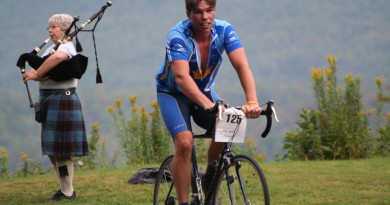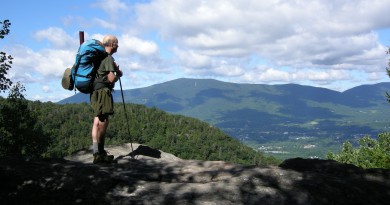Bud Keene: Father of Snowboarding
By
Bill McCollom
Posted February 1st, 2007
The Olympic gold-medal coach reflects on the sport, the games, and his plans for the future.
Bud Keene’s house is perched on a hillside overlooking the village of Moscow, Vermont, a stone’s throw from Stowe, where he lives with his wife Lucy and sons Zack, 14, and Kyle, 9. Bud is the new snowboard freestyle coordinator for the Mt. Mansfield Ski and Snowboard Club (MMSC). His return to Mount Mansfield is more of a homecoming after a four-year stint as head coach of the U.S. national snowboard freestyle squad. At the 2006 Olympics, Keene’s small, eight-rider contingent earned two gold medals, two silvers, two fourths and a sixth, making Keene arguably the most successful coach in the history of the U.S. Ski and Snowboard Team. I met up with Bud at the beginning of the ski season to hear his reflections on the Olympics and find out what his plans are for the future.
VS: How did you become involved in snowboarding?
BK: I moved from Virginia Beach to Stowe in 1983 with my sister to learn to ski. That same year I saw Lowell Hart, the early snowboard pioneer in these parts, walking down the road with a snowboard. It was pretty primitive—just a piece of plywood. I rented one and went up on Big Spruce with Lowell. I made my first turns and I immediately knew that I was in love with it.
VS: Since snowboarding wasn’t allowed on the Mountain at that time, how did you cope?
BK: We’d hike up every day for three years. And we didn’t just hike; we’d hike all the way to the chin. We’d do this three, four, even six times a day. Lucy and I went out to Squaw Valley in 1985, and in 1987, when Mt. Mansfield opened its doors to snowboarding, we came back and got jobs as the first instructors.
VS: How’d you get involved with the national team?
BK: I was coaching at Stowe, and had put down some good riders and got the attention of the national team. In 2002 I was invited to coach the forerunners for the Olympic halfpipe competition. At first I wasn’t really on the staff, but I was officially hired May 1, 2002, as assistant halfpipe coach, and within the year I was promoted to head halfpipe coach.
VS: Many of the riders on your Olympic team had no affiliation with the USST. How did you build the sense of a team?
BK: I had already worked with all of them, regardless of their affiliations. I knew all along that a good rider/coach relationship would be the key to a successful Olympics. I was already looking ahead; my job was to win medals. Snowboarding is a different sport, and encouraging different approaches is a part of that.
It started with our Olympic Sessions Project, which was an early season camp that brought everyone together in December of 2005 at Copper Mountain. They built the first super-pipe in the country with access restricted to just us for 10 days. It was one of the coldest Decembers on record so we didn’t get that much done, but the most important thing about the camp was it started to bring everyone together as a team.
VS: What can you say about Shaun White regarding his gold medal performance?
BK: Shaun’s always been the best—a prodigy from Carlsbad, California. His natural talent is off the scale. He has incredible body control—kind of a relaxed control. He has style, he’s competitive and he’s very driven. He’s not easy on himself.
VS: Shaun doesn’t seem to be the prototypical Olympic athlete. Does he fight this image?
BK: He doesn’t care about fighting it. Shaun skateboards as soon as the season is over and in the winter he only snowboards. He does less physical conditioning than any World Cup skier, preferring instead to practice his chosen sport for hours a day, yet he is utterly dominant. That’s not to say snowboarders are out of shape. It’s an acrobatic sport and having meat for thighs doesn’t necessarily make you the best snowboarder, at least in halfpipe.
He’s one of the most impressive people I’ve met. He’s had to walk down the street for the past 10 years and have people say, “You’re the man, Shaun! Dude, you’re killing it,” but he deals with it amazingly well. There’s no attitude; he’s genuine and humble.
VS: What about your other gold medalist, Hannah Teter?
BK: We brought Hannah to the team when she was 15. It was obvious to us that she would be unbelievable and we wanted a hand in her development. She was strong and crazy, growing up in a family with four brothers in Belmont, Vermont. They’d be swinging from trees, cliff jumping, whatever. This is where her strength of mind and body comes from, along with her ability to loosen the screws when she wants to and go for it. You know, if they’re all too tight, you’re not going to be any good.
She actually changed the sport, starting with going far, far, far bigger out of the pipe. She was crushing the best women in the world on sheer amplitude. She was also the first woman to do a 900 (two and a half revolutions) in the pipe and land it consistently. The other women responded—the potential was there, but to realize it takes someone to unlock that door and then everyone else rushes in.
VS: Why has Vermont produced so many outstanding snowboarders?
BK: There are a lot of people in a small place. When Kelly Clark, Ross Powers, Hannah and her brothers came up, there were more halfpipes along route 100 than in most other places in the U.S. And then there’s the eastern mindset—riding in bad weather, in adverse conditions, riding on ice. Pipes are icy without exception and you’ve got to have sharp edges and know how to use them. There’s also good coaching around the state, lots of academies and strong programs. Tradition also plays a role. This is the birthplace of snowboarding and it makes for a small ecosystem back here.
VS: What was your favorite Olympic memory?
BK: Seeing Shaun land his last trick on his second qualification run and in the finals. Afterwards, I quietly walked away from the start, and when I got over close to the woods, I just screamed. There was also seeing Hannah win gold and Gretchen Bleiler win silver. To see the flag wrapped around Hannah and Gretchen, it was at that moment that I realized my job was done and we had won. I’ve never had a job where I could kick-ass every day, every week, year after year, but it would all be diminished if I didn’t get the job done at the Olympics. One-hundred-percent of our grade was based on this final exam. It was a big release.
VS: Has it been a difficult transition adjusting to life in Stowe?
BK: It’s a mixture of feelings. I’m really psyched to be with my family again. My deal all along was that I’d do this for four years and then come home. I couldn’t live that level of intensity again for the next four years, but that being said, I do miss it. When I woke up every morning I knew what my focus was. Now, I have several goals here on planet earth—reacquainting myself with my family, along with three separate projects: my job with MMSC, producing an instructional DVD for USSA, and launching a clothing business. But even though all that stuff keeps my mind occupied, it used to be a lot less complicated.


